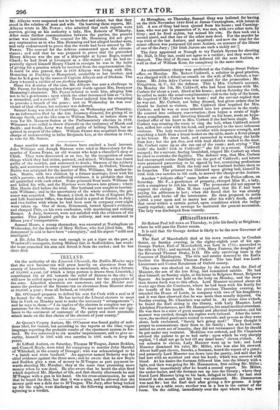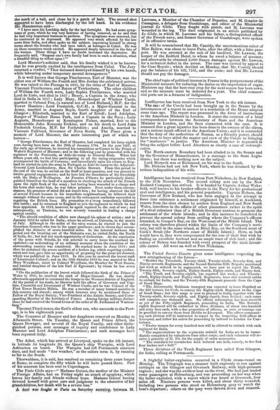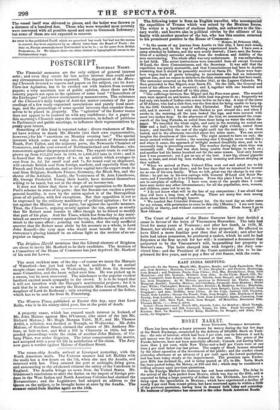Itlistellaneous.
Sir Robert Peel left town on Thursday, to join his family at Brighton; where he will pass the Easter recess.
It is said that Sir George Arthur is likely to be the new Governor of Bombay. The Earl of Macclesfield died at his town residence, in Conduit Street, on Sunday evening, in the eighty-eighth year of his age. George Parker, Earl of Macclesfield, was born in 1755 ; succeeded to the title in 1795; and married, in 1780, Mary Frances, the daughter of the Reverend Thomas Drake, D.D. His only surviving issue is the Countess of Haddington. The title and estates descend to the Earl's brother the Honourable Thomas Parker. The late Earl was Lord- Lieutenant and Custos Rotulorum of Oxford county.
The town was shocked on Monday by the news that the Earl of Munster, the son of the late King, had committed suicide. He had shot himself, on Sunday night, at his house in Belgrave Street, Belgrave Square. An inquest was held on the body on Monday, and the story then drawn forth was to this effect. Lord Munster returned about six weeks ago from the Continent, where he had been with his family for the benefit of his health. On the previous Thursday evening, he attended the House of Lords, in company with two of his daughters; and it was then observed that he was more than usually dejected. On Sunday evening, Dr. Chambers was called in. At about nine o'clock, he found the Earl sitting in the library, with Lady Munster, Lord Adolphus Fitzelarence, and Mr. Hammerton, his usual medical attendant. He was then in a state of great mental and physical depression; and his manner was excited, though his replies were rational. After the inter- view, the medical gentlemen retired to consult; and as soon as they were alone, both exclaimed, "Surely he's going mad !" They thought it proper to communicate their fears to his family ; but as be had com- mitted no overt act of insanity, they did not recommend that he should be pat under any restraint. Medicine was ordered, and Dr. Chambers advised the patient to go to bed early : upon which he very sharply replied, "I shall not go to bed till my usual hour," eleven o'clock. At ten minutes to eleven, Lady Minister went up to bed ; and Lord Munster dismissed his valet, Mr. Miller, who was also his steward. About half-past eleven, Snooks, a footman, heard the report of a pistol ; and presently Lord Munster ran down into the pantry, and said that he had met with an accident and shot his hand ; which was covered with blood. At his desire the footman followed him into the library with a light, and then was going for Mr. Hammerton, first calling Mr. Miller ; but almost immediately after he heard a second report. Mr. Miller, the under-butler, and the footman ran up into the library ; where they found Lord Munster lying on his back, deluged in blood : he had shot himself in the mouth, and his head was shattered. Mr. Hammertoa was sent fir; but the Earl died after giving a few groans. A large pistol lay on a table near; another was in a box in the corner of the room. On the ceiling, immediately over the spot where he lay, was
the mark of a ball, and close by it a patch of hair. The second shot appeared to have been discharged by the left hand. In his evidence Mr. Hammerton said-
" I have seen his Lordship daily for the last fortnight. He had some symp- toms of gout, which he was very desirous of having removed, as he said that he had very important business to perform. The symptoms were removed, but he continued to be depressed. He appeared very much affected by the late news from India, and often spoke on the subject, expressing himself in strong terms about the females who had been taken as hostages at Cabul. He was on these occasions much excited. He appeared deeply interested in the fate of the women. These things I have no doubt increased the depression. He frequently said, 'Suppose one's own family had been in such a situation, what a dreadful thing to reflect upon !
Lord Munster's solicitor said, that his family wished it to be known, that he was greatly excited by the intelligence from Cabul The Jury returned a verdict, "That deceased destroyed himself by his own hands, while labouring under temporary mental derangement."
It is well known that George Fitzclarence' Earl of Munster, was the eldest son of William the Fourth and Mrs. Jordan the celebrated actress. He was raised to the Peerage in 1831, by the titles of Earl of Munster, Viscount Fitzclarence, and Baron of Tewkesbury. The other children of William the Fourth were, Lady Sophia Fitzclarence, who married Lord de Lisle, and died in 1837; Henry, a Captain in the Army, who died in India in 1817; Lady Mary, Housekeeper at Windsor Castle, married to Colonel Fox, (a natural son of Lord Holland,) M.P. for the Tower Hamlets ; Lord Frederick, G.C.H., a Major-General in the Army, married to Augusta Boyle, fourth daughter of the Earl of Glasgow ; Elizabeth, married to the Earl of Erroll; Lord Adolphus, Ranger of Windsor Home Park, and a Captain in the Navy ; Lady Augusta Housekeeper at Kensington Palace, married, first to the Honourable John Kennedy Erskine, and on his death to Lord John Frederick Gordon' M.P. for Forfarshire ; and Amelia, married to Viscount Falkland, Governor of Nova Scotia. The Times gives a memoir of Lord Munster, the more interesting part of which we borrow- " George Fitzclarence, the Earl of Munster, had completed his forty-eighth year, having been born on the 29th of January 1794. In the year 1807, at the early age of thirteen, he received his commission as Cornet in the Prince of Wales's Regiment of Hussars; and in the following year he proceeded with his regiment to the Peninsula, as 'Aide-de-camp to General Slade. When but fifteen years old, we find him participating in all the trying exigencies which accompanied the battle of Corunna; and immediately upon his return to Eng- land he started to join the army in Portugal, as Aide-de-camp to the Adjutant- General Lord Londonderry, then Sir Charles Stewart. From this period to the end of the war, he served on the Staff at head-quarters, and was present in twelve general engagements; and he here laid the foundation of his friendship with the Duke of Wellington. At Fuentes d'Onoro he particularly distin- guished himself at the head of a squadron in checking the attack of the French -upon the right flank of the army ; but having been wounded in a charge and his horse shot under him, he was taken prisoner. Even under these circum- stances, his presence of mind did not desert him ; for having observed the fall of several French hussars in his immediate neighbourhood, he followed their example without the same cause, and in the subsequent confusion succeeded in regaining the British lines. His promotion to a troop immediately followed this battle; and be returned to England to join the regiment to which he had been appointed. In 1813, however, he again repaired to the seat of war • and subsequently, at Toulouse, he was severely wounded in leading a charge against cavalry. "The altered condition of affairs now changed his sphere of action ; and in January 1815 he sailed for India; where he arrived, at Calcutta, in the month of July. Although in the midst of the rainy season, he started to join the Governor-General, who was in the upper provinces; and in eleven days accom- plished the distance of seven hundred miles. In the interval between this period and the breaking out of the Mahratta war, he visited Delhi, the North of India, &c , but had not much opportunity of distinction. At the conclusion of the peace with Scindia, he was selected to carry home the overland de- spatches—an undertaking of no ordinary moment when the condition of the surrounding country was considered. He reached home in June 1818; and then he sustained the severe accident of a broken leg, which requiring confine- ment and rest, gave him an opportunity of preparing for the press his Journal, which was published in June 1819. In this year he received the brevet rank of Lieutenant-Colonel ; and on the 18th October 1819 he was married to Miss Mary Wyndham sister to Colonel Wyndham, the Member for West Sussex, and natural daughter of the late Earl of Egremont ; by whom he has seven children.
"On the publication of the brevet which followed the birth of the Prince of Wales in 1841, he received the rank of Major. General. He was shortly afterwards appointed to command the troops in the Western district of England. At the penod of his death, he likewise held the offices of Governor and Cap- tain, Constable and Lieutenant of Windsor Castle, and he was Colonel of the First Tower Hamlets Militia. He was a member of many learned societies in this country and abroad; among which honours may be mentioned those of Fellow of the Royal Society, Vice-President of the Asiatic Society, and Corre- sponding Member of the Institute of France. Among foreign military distinc- tions he had received the Grand Cross of the order of St. Ferdinand of Wurtem- berp."
Viscount Fitzclarence, the Earl's eldest son, who succeeds to the Peer- age, is in his eighteenth year.
The Countess of Munster and her daughters removed on Monday to Albemarle Street. On Tuesday, the Queen and Prince Albert, the Queen Dowager, and several of the Royal Family, and other distin- guished persons, sent messages of inquiry and condolence to Lady Munster and Lord Adolphus Fitzclarence ; and such messages have been repeated daily.
The Athol, which has arrived at Liverpool, spoke on the 5th instant, in latitude 34 longitude 30, tbe Queen's ship Warspite, with Lord Ashburton on board. The Warspite had left Portsmouth nineteen days, and had made "fine weather," as the sailors term it, by running so far to the South.
Thorwaldsen, it is said, has resolved on remaining three years longer at Rome, to complete the fifty which he will have passed there. Part of his museum has been sent to Copenhagen.
The Paris Globe says—" Madame Gnizot, the mother of the Minister of Foreign Affairs, had on Friday night an attack of apoplexy, which leaves her family and friends without hope. Madame Giuzot having devoted herself with great care and judgment to the education dim grandchildren, her death will be a severe loss."
4.illx1 WS fought at Paris on Saturday moping? between M. Lacrosse, a Member of the Chamber of Deputies, and M. Grassier de Cassagnac, a delegate from Guadeloupe, and editor of the Ministerial journal Le Globe. They fought with pistols, and M. Lacrosse was wounded in the leg. The duel originated in an article published by Le Globe, in which M. Lacrosse and his father, a distinguished officer of the French navy, and former Governor of Guadeloupe, were spoken of in offensive terms.
It will be remembered that Mr. Cassidy, the unceremonious suitor of Miss Bellew, was about to leave Paris, after the affair, with a false pass- port. He was arrested at the suit of his landlord, Mr. Lawson, the keeper of the Bedford Hotel, to whom he owed a balance of account; and afterwards he obtained 2,000 francs damages against Mr. Lawson, for a technical defect in the arrest. The case was carried by appeal to the Cour Royale ; which decided on Monday, that Mr. Cassidy should pay the balance of his bill, 7251., and the costs; and that Mr. Lawson should not pay the damages.
The chief topic of political interest in France is the postponement of the Ministerial measure for reducing the duties on the importation of sugar. Ministers say that the beet-root crop for the next season has been sown, and so the measure must be deferred for a year. The chief commer- cial ports are in a ferment of indignation.
Intelligence has been received from New York to the 4th instant.
The visa of the Creole had been brought up in the Senate by the introduction of a report in answer to a resolution of the House adopted some time ago. The report was presented in the form of instructions to the American Minister in London. It states the contents of a brief correspondence between the Secretary of State and the American Minister in London, and the facts connected with the case. It is assumed that a great injustice has been done to the owners of the slaves, and a serious insult offered to the American Union ; and it is contended that the duty of the authorities of Nassau, as a friendly power, should have been to have aided the master and crew of the Creole in bringing the "mutineers" to justice. The American Minister is requested to bring the subject before Lord Aberdeen as clearly a case of indemnifi- cation.
The North-eastern Boundary had been alluded to in the Senate and by the Governor of Massachussets, in a message to the State Legis- lature; but there was nothing new on the subject.
Lord Morpeth was at Richmond, on his way to the South.
Mr. Dickens had not left New York, where he was detained by the serious indisposition of his wife.
Intelligence has been received from Port Nicholson, in New Zealand, to the 27th November. The second colony sent out by the New Zealand Company has arrived. It is headed by Captain Arthur Wake- field, well known to his brother officers in the Navy for his professional zeal and intelligence, and his general popularity. Captain Hobson, the Governor of New Zealand, who has been engaged in the attempt to force into existence a settlement originated by himself, at Auckland, remote from the sites chosen by settlers from England and New South Wales, interferes in the affairs of other plantations rather in the spirit of a rival colonizer than of a British Governor anxious to promote the settlement of the whole islands ; and in this instance he interfered to prevent the second colony from settling where the Company's officers intended, in Cooper's Bay, on the West coastof the Middle Island. The colony was therefore placed within the limits of the Company's terri- tory, but still in the same island, at Blind Bay, on the Southern coast of Cook's Strait (the Northern coast of Middle Island.) Here, as luck would have it, they were compensated for the loss of their first wish by finding an excellent harbour and an ample tract of rich land ; and the colony of Nelson was founded with every prospect of the most favour- able career. All went on well at Port Nicholson.
The United Service Gazette gives some intelligence respecting the new strengthening of the forces- " Besides the Twentieth, Twenty-third, Twenty-ninth, Seventy-first, and Ninety-seventh Regiments, and the Second Battalion Rifle Brigade, mentioned last week as ordered to be augmented, we have now to report the Tenth, Twenty-fifth, Seventy-eighth, Eighty-fourth, Eighty-sixth, and Ninety-first. "The Tenth and Seventy-eighth, (as reported last week,) and Twenty- ninth, Eighty-fourth, and Eighty-sixth Regiments, have also received orders to embark for India; and the Twenty-fifth Regiment proceeds from the Cape of Good Hope. "The Abercrombie Robinson transport was expected to leave Deptford on the 22d instant, for Cork, to convey the Eighty-sixth Regiment to the Cape of Good Hope; but this corps is now to proceed to India, together with the Twenty-ninth, Seventy-eighth, and Eighty-fourth, from Ireland : each corps will complete one thousand men. No official information has been received as yet of the Fifty-eighth Regiment, proceeding to India. The Seventy- eighth Regiment will be embarked in three divisions, of about two hundred and sixty men each, with a due proportion of officers, as soon as tonnage can be provided to convey them from Dublin to Liverpool. The officer command- ing each division will be instructed to report to the inspecting field-officer at Liverpool, and follow his orders for proceeding by railroad to London for Can- terbury.
"Twelve women for every hundred men will be allowed to embark with each regiment for India.
"The augmentations to the regiments ordered for India are to be imme- diately completed by volunteers from other corps ; and each volunteer will re- ceive a gratuity of 11. 10s. for the supply of extra necessaries. " The standard for recruits has been reduced one inch, namely, to five feet four inches and a WC"
Three divisions of the Tenth Regiment have sailed from Glasgow, for India, calling at Portsmouth.
A frightful boiler-explosion occurred in a Clyde steam-vessel on Monday, The Telegraph was a steamer built expressly to run against carriages op the Glasgow and Greenock Railway, with high-pressure engines ; end she was the swiftest boat on the river. She had just landed some passengers at Helensbnrg, and was proceeding on her way when the butler exploded, with a report which was heard at Greenock, four miles off. Nineteen persons were killed, and about thirty wounded, Including two persons who stood on Helensburg quay to watch the boat's departure; others on the play were thrown dowu end stunned,
The vessel itself was shivered to pieces, and the boiler was thrown to a distance of a hundred feet. Those who were wounded most severely were conveyed with all possible speed and care to Greenock Infirmary ; but some of them are not expected to recover.




























 Previous page
Previous page